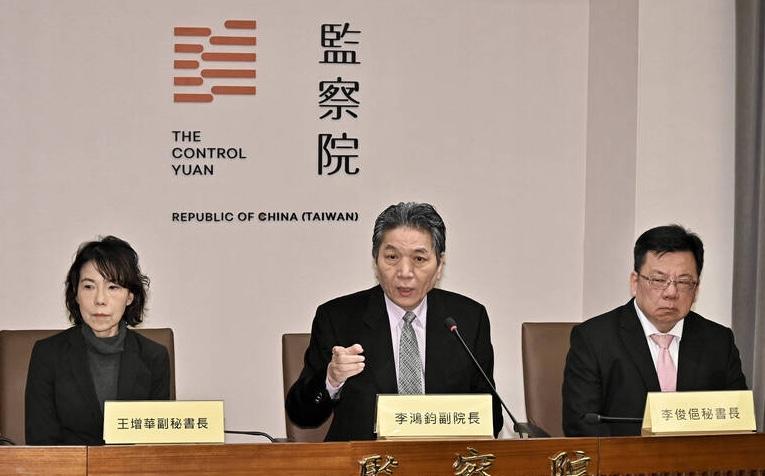The Control Yuan today said it has been “left with no choice” but to ask the Constitutional Court to rule on the constitutionality of the central government budget, after its operating expenses were slashed by 96 percent.
The Legislative Yuan in January cut the central government budget for this year, severely impacting the Control Yuan’s ability to exercise its constitutional duties and continue fundamental operations.
Control Yuan Vice President Lee Hung-chun (李鴻鈞), Secretary-General Lee Chun-yi (李俊俋) and various department directors today held a news conference on the matter.

Photo: Tu Chien-jung, Taipei Times
The Control Yuan has “no way to move forward” amid the cuts and would file for a constitutional interpretation and a provisional injunction from the Constitutional Court once the president promulgates the budget, they said.
The Control Yuan has repeatedly issued news releases and convened news conferences to highlight the impact the cuts would have on operations, including property declarations, political donations, conflicts of interest, accepting public petitions, investigations, inspections and impeachments, they said.
The National Human Rights Commission has all but stopped operations, and although it had secured the right to host the annual conference of the International Ombudsman Institute this year, the event may be canceled due to insufficient funding, potentially damaging Taiwan’s credibility in the international community, they added.
Disputes over the budget are not merely a cross-partisan conflict, but a constitutional crisis, Lee Hung-chun said.
Directors of departments across the Control Yuan have been paying their own fuel expenses for government vehicles, Lee Chun-yi said.
Moreover, the Control Yuan has been unable to pay the last two months’ water, electricity and telecommunication bills, with Taiwan Power Co (Taipower) having requested a repayment plan, he added.
Were it not for agreements with Taipower and Chunghwa Telecom Co, the Control Yuan would have already had its water and electricity shut off, he said.
Regarding the health of Control Yuan President Chen Chu (陳菊), Chen is working hard on her recovery and remains in a stable condition, and she thanks the public for their concern, Lee Hung-chun said.

The Coast Guard Administration (CGA) yesterday said it had deployed patrol vessels to expel a China Coast Guard ship and a Chinese fishing boat near Pratas Island (Dongsha Island, 東沙群島) in the South China Sea. The China Coast Guard vessel was 28 nautical miles (52km) northeast of Pratas at 6:15am on Thursday, approaching the island’s restricted waters, which extend 24 nautical miles from its shoreline, the CGA’s Dongsha-Nansha Branch said in a statement. The Tainan, a 2,000-tonne cutter, was deployed by the CGA to shadow the Chinese ship, which left the area at 2:39pm on Friday, the statement said. At 6:31pm on Friday,

The Chinese People’s Liberation Army Navy’s (PLAN) third aircraft carrier, the Fujian, would pose a steep challenge to Taiwan’s ability to defend itself against a full-scale invasion, a defense expert said yesterday. Institute of National Defense and Security Research analyst Chieh Chung (揭仲) made the comment hours after the PLAN confirmed the carrier recently passed through the Taiwan Strait to conduct “scientific research tests and training missions” in the South China Sea. China has two carriers in operation — the Liaoning and the Shandong — with the Fujian undergoing sea trials. Although the PLAN needs time to train the Fujian’s air wing and

The American Institute in Taiwan (AIT) put Taiwan in danger, Ma Ying-jeou Foundation director Hsiao Hsu-tsen (蕭旭岑) said yesterday, hours after the de facto US embassy said that Beijing had misinterpreted World War II-era documents to isolate Taiwan. The AIT’s comments harmed the Republic of China’s (ROC) national interests and contradicted a part of the “six assurances” stipulating that the US would not change its official position on Taiwan’s sovereignty, Hsiao said. The “six assurances,” which were given by then-US president Ronald Reagan to Taiwan in 1982, say that Washington would not set a date for ending arm sales to Taiwan, consult

A Taiwanese academic yesterday said that Chinese Ambassador to Denmark Wang Xuefeng (王雪峰) disrespected Denmark and Japan when he earlier this year allegedly asked Japan’s embassy to make Taiwan’s representatives leave an event in Copenhagen. The Danish-language Berlingske on Sunday reported the incident in an article with the headline “The emperor’s birthday ended in drama in Copenhagen: More conflict may be on the way between Denmark and China.” It said that on Feb. 26, the Japanese embassy in Denmark held an event for Japanese Emperor Naruhito’s birthday, with about 200 guests in attendance, including representatives from Taiwan. After addressing the Japanese hosts, Wang